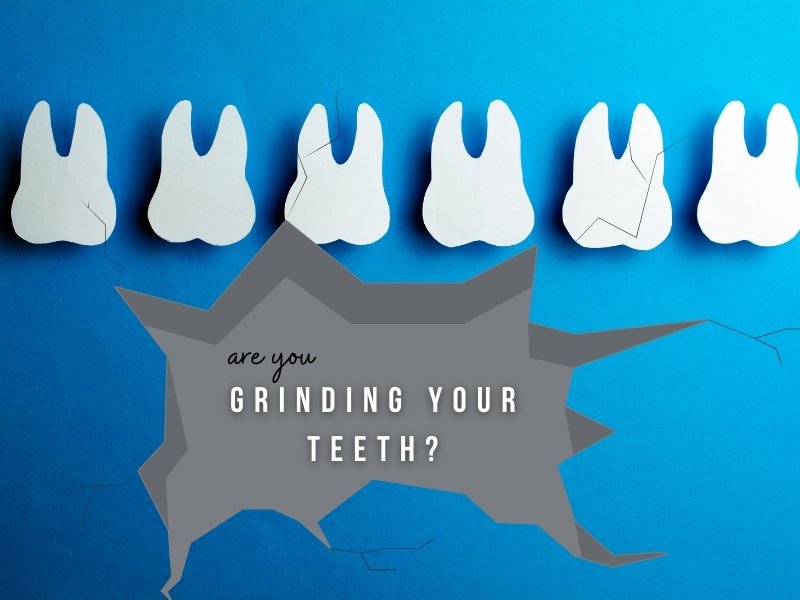Teeth grinding is a common cause of tooth sensitivity, a dental condition affecting about one in ten people. Exactly how accurate is that number? This is difficult to determine because most people don’t even realize they are grinding their teeth until a partner informs them or a dentist notices structural changes in their teeth during an exam.
Teeth grinding is most common in childhood through young adulthood. You may not even know you are grinding your teeth at night until you start suffering tooth sensitivity symptoms or your partner complains about the noise.
Perhaps even more worrying is that teeth grinding in adults is frequently accompanied by more serious sleep concerns. Let’s talk about what makes you grind your teeth, how you can stop, and what your dentist can do to help.
Understanding Teeth Grinding
Teeth grinding, or “bruxism,” is the (often unconscious) act of frequent gnashing, grinding, or clenching of your jaw and teeth. When it happens while you’re awake, it is referred to as wake bruxism. If you are grinding your teeth at night, you have sleep bruxism.
Grinding Your Teeth at Night
Wake bruxism is more common and easier to notice. Again, most people who suffer from sleep grinding are unaware until a partner mentions it or a healthcare professional notices the collection of long-term symptoms.
Initially, you may not notice any discomfort. Over time, however, the symptoms of grinding your teeth at night will become more obvious. Symptoms include:
- Sore jaw
- Tooth sensitivity or pain
- Headaches, often in the temples
- Neck or face discomfort
- Pain resembling an earache unrelated to the ear
- Soreness of the jaw muscle
- Chewed spots on the inside of your cheeks
- Poor sleep
In addition to these symptoms, your teeth will be extremely impacted by constant teeth grinding. Your teeth can actually become flattened, or they may fracture or chip. Your teeth have a protective coating of enamel, but your enamel can become eroded, which will eventually leave the dentin exposed and cause tooth sensitivity. Dentin is largely composed of tiny tubes and canals, and when these exposed tubules touch very hot or cold food, the nerves in your teeth become painful.
How Do I Stop Grinding My Teeth at Night?
The exact cause of grinding your teeth is unknown, but a variety of factors can make it more likely. Sleep bruxism is often linked to other sleep disturbances (many of which go unnoticed until a partner mentions them), including sleep apnea, daytime sleepiness, and night terrors.
Some mental health concerns, including epilepsy, ADHD, Parkinson’s disease, and dementia, can contribute to grinding your teeth at night. Disorders like gastroesophageal reflux disease may also play a role. Certain medications may also increase the risk of teeth grinding, as can recreational drugs, alcohol, caffeine, and tobacco products.
Stress and other strong, negative emotions are also common contributors to bruxism. Furthermore, high stress levels can disrupt sleep patterns, making sleep disorders worse. Similarly, certain personality types are more prone to teeth grinding. People who are very energetic, aggressive, or competitive are at a higher risk of bruxism. Bruxism often runs in families. Individuals who have a familial history of teeth grinding are more likely to do so themselves.
Commonly Asked Questions about Teeth Grinding and Oral Health

Chronic teeth grinding can severely impact your oral health. Sensitivity and discomfort aside, the 250 pounds of force in your bite, utilized for hours every night, can cause serious damage. Let’s look at the damage you should be legitimately concerned about as a result of sleep bruxism.
Can grinding your teeth cause a cavity?
When your teeth are rubbing against one another with so much pressure for long periods of time, you eventually lose a lot of the layers designed to protect the sensitive insides from temperature changes and cavities. As the enamel wears away, your teeth become more vulnerable to cavities.
Can grinding your teeth crack a filling?
Crowns, fillings, and other dental restorations may not last your entire life. Everyone experiences everyday normal wear and tear, but when you grind your teeth, you’re actually increasing that force to regular, frequent, intense wear and tear. That can lead to your fillings cracking as a result of extreme pressure.
Can a dentist help me stop grinding my teeth?
Absolutely. In fact, dentists are the best healthcare professionals to do so. Not only can they help with sleep apnea, but dentists can also help with the frequent tooth sensitivity, fractures, looseness, and other structural concerns that develop as a result of teeth grinding.
How do I stop grinding my teeth at night?
Because of the many factors that contribute to sleep bruxism, determining which method of cessation is most effective for you depends on what’s causing it. You might need to cut back on your caffeine intake and meditate a little bit before bed. You might need to perform some jaw exercises, or you might need treatment for sleep apnea. The best answer to how to stop grinding your teeth at night is by getting a diagnosis from a medical professional and working with them to find the best treatment for you.
For More Information
If you’re wondering how to stop grinding your teeth at night, it’s time to call Dean Dental Solutions. Schedule an appointment today! Call (501)771-2911, or fill out our online form.


Leave a Reply